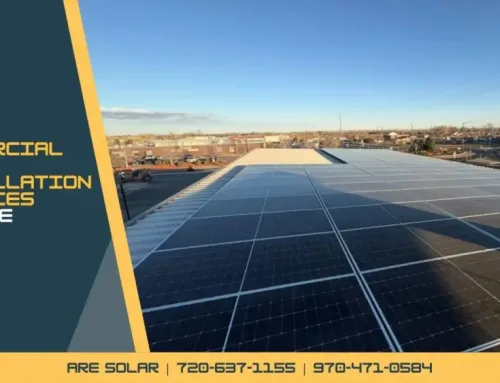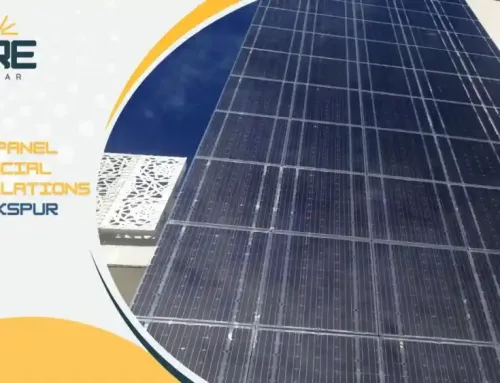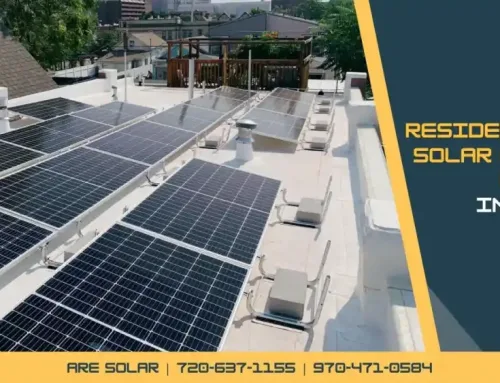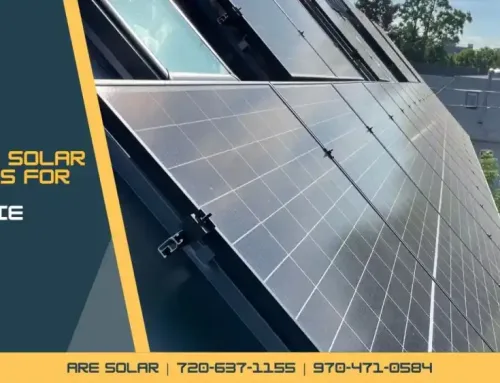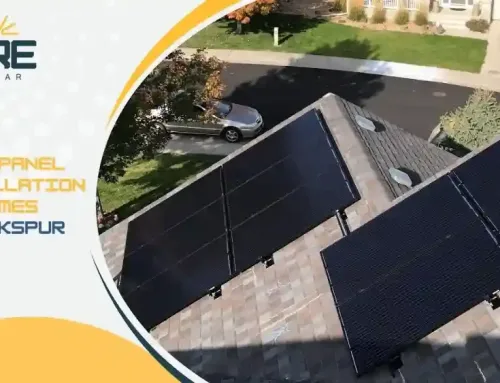Many people have the misconception that solar panels are not productive in winter. In this blog post, ARE Solar, the leading solar panel installation company in Denver, CO, explains that this is not the case. Solar panels generate energy during winter. We also remind readers considering solar panel installation that it can be done in winter. Signing up for solar panel installation in the winter ensures your system will be turned on in the spring and ready for the summer.
As the winter chill settles in, many homeowners wonder, “How do solar panels work in winter?” It’s a question we often hear, and it’s an important one. Solar panels have become a symbol of clean energy and sustainability, offering a way to reduce electricity bills and decrease carbon footprints. In Denver, CO, where we experience snowy winters, understanding how residential solar panels perform during this season is crucial. As the temperatures drop and snow falls, many wonder if solar panels can still generate electricity and if they’re affected by the harsh conditions.
ARE Solar explores how solar panels work in winter.ARE Solar is the best solar panel installation company in Denver, CO. We are a locally owned and operated full-service solar installation company, and our custom-designed solar panel systems meet the energy needs of homes or businesses efficiently. Colorado is a state of abundant sunshine, and we want to help the environment by making sure everyone can harness the power of the sun. ARE Solar offers our customers in Denver the opportunity to live with clean, emission-free, renewable energy.
The good news is that solar panels are designed to withstand winter weather and continue to produce power efficiently. Let us take a peek into the science behind solar panels, their ability to generate electricity in various weather conditions, and the benefits they offer in extreme weather situations. Let’s discover how solar panels work in winter and how they can benefit you.
Winter Weather Impact on Solar Panels
Solar panels can be affected by various weather conditions in winter. We need to consider the impact of winter weather on solar panels for proper maintenance.
Temperature and Solar Panel Performance
In Denver, CO, where winter temperatures can be quite frigid, understanding how temperature affects the performance of your solar panels is vital. As a seasoned solar panel company in the area, we know extreme cold can impact your solar panel efficiency.
However, even in cold weather, solar panels produce electricity. While the output may dip slightly, they still contribute to your energy needs, especially during sunny winter days.
Maximizing Winter Solar Panel Performance
To maximize your solar panels’ winter performance, consider a few strategies:
Regular Maintenance: Ensure that your solar panels are well-maintained year-round. Keep them clean and free from debris to optimize their exposure to sunlight.
Proper Installation: Partnering with a qualified solar panel installation contractor like ARE Solar ensures that your panels are installed correctly, with optimal tilt and orientation, which can enhance winter performance. Solar panels have different pressure ratings, and stronger panels can be more expensive. Working with an expert can help you choose the right panels for your climate and budget.
Snow Management: Discuss snow management options with your installer if heavy snowfall is common in your area. This may include steeper panel angles to help snow slide off more easily. One of the main concerns during winter is the accumulation of snow and ice on the panels. However, solar panels are designed to handle the weight of accumulated snow and ice, so they are unlikely to be damaged by adverse weather conditions. Know that solar panels have different pressure ratings, and stronger panels can be more expensive.
Working with an expert can help you choose the right for your climate and budget. In most cases, panels are installed flush to your roof, following the roof angle. . The sun usually melts the snow off of the panels along with the rest of the roof. . However, in some cases, panels may need to be manually cleared off to prevent power interruptions.
Melting snow off of a large array can sometimes slide off all at once, causing an avalanche affect. ARE Solar designers and site evaluators recognize this hazard. Often times there is space on the roof below the array for the roof to catch the snow. But, if an PV array is located above a driveway or porch, the installation of snow guard rails below large PV arrays is recommended. The homeowner’s safety is a foremost concern for ARE Solar.
Solar panel installation experts like ARE Solar in Denver, CO, install solar panels with attention to the orientation to get maximum exposure to the sun and at an angle that will facilitate snow to slide off the panels.
Monitor Performance: Invest in a solar monitoring system to closely monitor your panels’ performance. This can help you identify issues promptly and ensure maximum efficiency. ARE Solar monitors the performance of solar panel systems using diagnostic equipment as part of its maintenance services.
While winter weather can affect solar panel performance, with proper maintenance and the right strategies, you can continue to reap the benefits of clean, renewable energy throughout the year in Denver, CO. Don’t let the cold discourage you from investing in solar panels for your home.
Despite the challenges of winter weather, solar energy systems can still be effective during colder months. Solar panels generate electricity from light, not heat, so that they can be more efficient during winter under the right conditions. Electronics run more efficiently at cold temperatures, which increases energy production. Snow on the ground reflects light onto the panels, providing an extra boost.
Potential Power Interruptions During Winter Storms
How can winter storms potentially interrupt power for solar panels? During winter storms, power interruptions for solar panels are possible. While solar panels are designed to handle adverse weather conditions, completely blocked panels cannot generate power.
Winter Storms and Grid Outages
In the midst of winter storms, power outages can be a common concern for homeowners. While solar panels offer a reliable source of energy, they are typically grid-tied, meaning they are connected to your local electrical grid. So, how do they fare during these challenging conditions?
Grid-Tied Solar Panels in Winter
Grid-tied solar panels can experience power interruptions during severe winter storms. When the grid goes down, safety regulations require solar panel systems to automatically shut down to prevent back-feeding electricity into the grid, which could endanger utility workers.
Backup Solutions for Continuous Power
Homeowners can consider backup solutions such as solar battery storage to ensure continuous power supply during winter storms. Solar batteries store excess energy generated by your panels during sunny days, allowing you to use them when the grid is down. This provides peace of mind and keeps your lights on even in the harshest winter conditions.
If you experience power interruptions during winter storms, contact a solar panel installation contractor for assistance. They can help identify the issue and guide how to address it. They can also ensure that your panels are properly installed and maintained to minimize the risk of power interruptions. At ARE Solar, we understand the importance of having a reliable power source, especially during winter storms in Denver, CO. Our team can help you explore backup options and ensure your solar panel system is equipped to handle any weather-related challenges.
While grid-tied solar panels may experience temporary interruptions during winter storms, backup solutions like solar battery storage can provide a reliable power source, allowing you to enjoy the benefits of residential solar panels even when the grid is down.
Effectiveness of Solar Panel Systems in Winter Weather
During the winter months, solar systems can be even more effective in generating electricity due to the increased efficiency of electronics in colder temperatures. This is especially true in colder climates like Denver, CO, where residential solar panel companies, such as ARE Solar, can help homeowners take advantage of the winter weather to maximize energy production.
The efficiency of solar panels is not dependent on heat but rather on the absorption of light. In fact, under the right conditions, solar panels can generate more electricity during colder months. In freezing temperatures, electronics, such as inverters that convert the direct current (DC) produced by the panels into usable alternating current (AC), run more effectively. Higher energy generation results from better efficiency.
Additionally, snow on the ground can reflect light onto the panels, providing an extra boost to energy generation. Colorado’s winter sun is bright, making it an ideal state for solar energy production. Despite the cold weather, solar panels are designed to handle the weight of accumulated snow and ice, and they are unlikely to be damaged by adverse weather conditions.
Solar panels can last for decades with proper installation and maintenance. Working with a reputable residential solar panel company like ARE Solar can ensure your system is designed to handle the winter weather in Denver, CO, and maximize energy production throughout the year. Their experts understand the local climate and can provide tailored guidance and expertise for your solar energy system.
How ARE Solar Can Help With Solar Energy Systems
ARE Solar, as an experienced residential solar panel company, offers tailored guidance and expertise to assist homeowners in maximizing their solar energy systems’ performance throughout the year. Our team understands the unique challenges that winter weather can pose to solar panels and is here to help you overcome them.
When it comes to solar panel installations, one size does not fit all. We take a personalized approach to designing and installing PV systems. We consider factors such as your local climate and personal energy needs to ensure you have the most efficient and effective solar energy system for your home.
If you have any questions or concerns about your solar panels’ performance during the winter months, don’t hesitate to contact us. Our experts are well-versed in solar panels and temperature science and can provide the information you need to make informed decisions.
In addition to installation and guidance, we also offer maintenance services to keep your solar panels operating at their best. ARE Solar’s maintenance services include ensuring that all solar panels attach securely to their mountings and your roof, inspecting solar panels for signs of mechanical or electric issues, inspecting all wiring for signs of corrosion or deterioration, ensuring that all electric connections and fittings are secure, checking the inverter display for fault notifications, ensuring that the isolator switches are working, and monitoring your solar panel system’s performance using diagnostic equipment.
We understand that power outages during winter storms are common. Grid-connected rooftop solar panel systems with battery storage provide backup electricity during power outages, giving peace of mind.
At ARE Solar, we are committed to helping homeowners make the most of their solar energy systems year-round. Whether you’re considering solar panel installation or need assistance maximizing the performance of your existing system, we’re here to help.
Science Behind Solar Panels and Temperature
Understanding the relationship between temperature and solar panels is crucial for maximizing efficiency and performance. Solar panels absorb energy from sunlight, not heat, so cold climates are optimal for their efficiency. Solar panels also produce electricity more efficiently in colder temperatures.
One reason is that electronics, including solar panels, run more efficiently at cold temperatures. The lower temperature helps to reduce resistance in the electrical components, allowing for a more efficient flow of electricity. This fact is explained on the molecular level – electrons are at rest (low energy) in cold temperatures. When these electrons are activated by sunlight (high energy), the photovoltaic panel attaches a greater voltage difference, resulting in a higher energy output than the panel could create on a warm day. The cooler weather helps prevent overheating, which can reduce the overall output of the panels.
Snow on the ground can act as a natural reflector, bouncing sunlight back onto the panels and increasing their energy production. This increased efficiency can lead to higher energy production from the solar panels during the winter months.
Snow on the ground can provide an extra boost to solar panels. Snow reflects light onto the panels, increasing the amount of sunlight they receive and their electricity production. This is particularly beneficial in states like Colorado, where the winter sun is bright and abundant.
Solar panels can also generate electricity in rainy weather. Rain and clouds cause diffuse light, which solar panels can still utilize to produce electricity. In addition, rain helps to wash away dust on the panels, keeping them efficient.
Benefits of Solar Panel Installation in Winter
Winter is a great time for solar panel installation because many homeowners tend to think that it’s not possible during this season. However, the reality is that most professional installers are less busy during the winter months, which means they may be more readily available to work on your project. By installing your solar panels in the winter, you’ll be ahead of the game when spring comes around and everyone else starts thinking about their installations. ARE Solar in Denver, CO, has a 90 to 120-day install turnaround. Signing up for solar panel installation in the winter ensures your system will be turned on in the spring and ready for the summer. Summertime in Colorado has 15 hours of sunlight daily, and it is the best time to harvest solar power! ARE Solar offers solar panel installation services in all seasons, and we are equipped to carry them out safely and efficiently.
Solar panels installed in winter allow the system to generate clean energy earlier. Even in cold weather, solar panels can still produce electricity. While they may not generate as much energy as during the peak production months of summer, the positive effect of cold weather largely offsets the lack of sunlight in winter. By installing solar panels in winter, you’ll save on your energy bills sooner and reduce your carbon footprint faster.
Frequently Asked Questions
1. Can snow and ice damage solar panels?
Yes, snow and ice can potentially damage solar panels. However, properly designed panels can handle the weight and generate heat to melt accumulation. Professional solar panel installers like ARE Solar in Denver install solar panels at an angle that facilitates snow to slide off.
2. How can I prevent my solar panels from being blocked by snow and ice?
Colorado’s powerful sun beams will melt the snow off of the panels with time. Manual clearing of panels is only necessary in extreme cases.
3. How do solar panels generate electricity in cold temperatures?
Solar panels generate electricity in cold temperatures by absorbing energy from sunlight, not heat. They are more efficient in colder months. This fact is explained on the molecular level – electrons are at rest (low energy) in cold temperatures. When these electrons are activated by sunlight (high energy), the photovoltaic panel attaches a greater voltage difference, resulting in a higher energy output than the panel could create on a warm day. Also, the cooler weather helps prevent overheating, which can reduce the overall output of the panels. Also, snow on the ground can act as a natural reflector, bouncing sunlight back onto the panels and increasing their energy production.
4. Are solar panels still effective in generating electricity during winter Weather?
Yes, solar panels are still effective in generating electricity during winter weather. Under the right conditions, they can be even more efficient due to colder temperatures and sunlight reflected off snow.
Enjoy Clean Energy Even in Winter With ARE Solar in Denver, CO
Solar panels are designed to withstand winter weather and continue generating electricity efficiently. They can still produce power even in snowy conditions, offering a reliable and sustainable energy source. Solar energy systems can be highly effective during the winter months with the right panels and installation. Suppose you’re considering solar panel installation or have questions about their winter performance. Experts like ARE Solar can provide the guidance and expertise needed to make the most of solar energy in any weather.
As your trusted solar panel company in Denver, CO, ARE Solar wants to emphasize the remarkable performance and significance of solar panels in the winter season. Despite the challenges posed by shorter days and colder temperatures, solar panels continue to generate clean and renewable energy. They are a sustainable choice, even in Denver’s snowy winters. Solar panels not only help you save on electricity bills but also contribute to reducing your environmental impact by harnessing the power of the sun.
So, if you’re a resident of Denver, CO, considering residential solar panels, there’s no need to wait until spring. Winter is an excellent time to invest in this eco-friendly and cost-effective solution. Contact ARE Solar, your trusted solar panel installation contractor in Denver, CO, at (720) 706-2773 to explore the benefits of solar energy for your home. Let us help you make this winter season your greenest yet while enjoying long-term savings. Switch to solar panels and embrace a brighter, sustainable future today.



